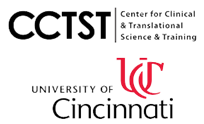Partners
PORTICO is working closely with other NIH Centers of Excellence, patient and professional organizations. PORTICO partners include:
The Center for Clinical and Translational Science and Training (CCTST) :
Established the CCTST in 2005, the CCTST at the University Of Cincinnati College Of Medicine provides a variety of services to faculty and young investigators for research design and implementation and career development, and ensures translation of discoveries to the community at large.
The Systemic JIA Foundation: The Systemic JIA Foundation’s mission is to find a cure for Systemic Juvenile Idiopathic Arthritis. The sJIA Foundation hosts an annual conference for patients and their families affected by sJIA and funds various research initiatives into the causes of sJIA and novel therapies for treatment.
Lupus Foundation of America : The Lupus Foundation of America (LFA) is the largest national organization devoted to improving the quality of life for all people affected by lupus through programs of research, education, support and advocacy. The LFA is focused on three strategic outcomes: reducing time to diagnosis, ensuring people with lupus have an arsenal of safe and effective treatments, and expanding direct services and increasing access to treatments and care.
Pediatric Rheumatology Collaborative Study Group : The Pediatric Rheumatology Collaborative Study Group (PRCSG) is a consortium of over 80 academic clinical pediatric rheumatology centers across the United States, Canada, and Puerto Rico. The PRCSG conducts high quality clinical trials of various therapeutic agents in children with rheumatic diseases, including juvenile idiopathic arthritis, lupus, and vasculitis among others.
Childhood Arthritis and Rheumatology Research Alliance : The Childhood Arthritis and Rheumatology Research Alliance (CARRA) was created to provide a research network for pediatric rheumatologists and other researchers. CARRA promotes collaborative research and works with patients and their families as well as investigators to find the best methods to discover the root causes and better treat pediatric rheumatic diseases.
Cincinnati Rheumatic Diseases Core Center
The Cincinnati Rheumatic Diseases Core Center is structured to foster new and existing interactions between adult and pediatric rheumatology divisions and the broader immunology and bioinformatics communities with the ultimate goal of impacting the outcome for children with rheumatic illness. The cores include :
Pediatric Rheumatology Tissue Repository
Director, Susan D. Thompson, PhD
Single Cell Phenotyping Core
Director, Sherry Thornton, PhD
Functional Genomics Core
Director, Leah Kottyan, PhD
Rheumatic Disease Research Informatics Core
Director, Michael Wagner, PhD
Data Management and Analysis Center
Director, Mekibib Altaye, PhD
Local and national members of the center may receive discounts and priorities for many core resources and services.
The Pediatric Rheumatology Care and Outcomes Improvement Network (PR-COIN) is a network of 20 hospitals in North American that follow a learning network organizational approach to improve outcomes and provide safe, effective, efficient, timely, patient centered, and equitable care for all children with rheumatic conditions. Our goals are to increase remission and clinical inactive disease rates among children with JIA, improve quality of life including optimal physical function and pain, and support families in managing their child’s condition. PR-COIN is a collaborative community where patients, parents, clinicians, and researchers work together. By sharing data, knowledge, and resources, PR-COIN members benefit from better prepared teams, improved outcomes for patients, increased patient engagement, and enhanced research opportunities.






